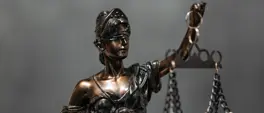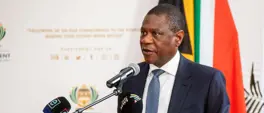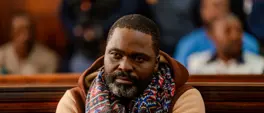AMANDA BLANKFIELD-KOSEFF: SA women's past achievements must pave way for a future of gender equality and social cohesion
Amanda Blankfield-Koseff
30 August 2024 | 13:33South Africa's journey to democracy has been marked by the tireless efforts and sacrifices of many women, but the role of women as agents of change remains crucial for the future to shape our country's destiny, writes Amanda Blankfield-Koseff.
This Women’s Month, we as South Africans are celebrating 30 Years of freedom towards women’s development.
We are a nation that has seen how women have fought against injustices in our past and present. We encourage the girls of today to strive to continue in their mothers’, aunts’ and grandmothers’ footsteps.
South Africa's journey to democracy has been marked by the tireless efforts and sacrifices of many women.
Over the past 30 years, South African women have fought for freedom, and have also emerged as powerful agents of change and transformation, playing a critical role in nation-building and fostering social cohesion.
The struggle against apartheid saw women stepping into roles as leaders and activists who are great examples of the bravery and resilience of women who fought for justice and equality.
Winnie Madikizela-Mandela - anti-apartheid activist and politician; Albertina Sisulu - nurse, midwife, anti-apartheid activist, and leader in the African National Congress (ANC) ANC Women's League; and Ruth First - journalist, academic, and anti-apartheid activist.
Their contributions laid the groundwork for a democratic South Africa, where women’s voices and actions would become central to the nation’s progress.
Since the first democratic elections in 1994, women have continued to drive change across various sectors. Women such as Nkosazana Dlamini-Zuma - politician and former chair of the African Union Commission, and Lindiwe Sisulu - a politician who has held various ministerial positions.
In politics, women have gained significant representation and influence. The introduction of policies like the Gender Equality Act, and the establishment of institutions such as the Commission for Gender Equality, have aimed to dismantle patriarchal structures and promote gender parity.
This year, we have the honourable Mandisa Maya appointed as South Africa’s first female Chief Justice to take over from Chief Justice Raymond Zondo. In her career, Justice Maya has distinguished herself as a brilliant legal mind and a trailblazer. This marks a landmark women’s achievement in the judiciary.
Economically, women have been at the forefront of entrepreneurship and innovation.
Female entrepreneurs in South Africa have broken barriers, contributing to economic growth and demonstrating that women can thrive in traditionally male-dominated industries.
We celebrate businesswomen such as Wendy Luhabe - businesswoman and social entrepreneur; Basetsana Kumalo - businesswoman, television personality, and philanthropist and Irene Charnley - former trade unionist and businesswoman.
And civil society organisations run by women such as Thuli Madonsela - former Public Protector and founder of the Thuli Madonsela Foundation; Gail Johnson - founder of Nkosi’s Haven, which supports mothers and children infected with HIV/Aids; and Nomonde Mbadi - founder of the Nomonde Mbadi Foundation, focused on education and healthcare.
At a community level, women have been vital in driving social cohesion and fostering a sense of unity.
Women's groups and organisations have played crucial roles in addressing social issues such as gender-based violence, healthcare, and education.
Women such as Makhosi Khoza - politician and advocate for social justice; Yvonne Chaka Chaka - singer and humanitarian, advocating for global health and education; and Ferial Haffajee - journalist and media leader advocating for freedom of expression and gender equality.
Education has been a powerful tool for transformation. Women have championed the importance of education in breaking the cycle of poverty and inequality. The current and previous Minister and Deputy Minister of Education are both women too.
Efforts to improve girls' access to education and promote female leadership in academia have yielded positive results.
Advocacy and activism continue to be at the heart of women's contributions to nation-building. Movements like #TotalShutdown and #AmINext have highlighted the pervasive issue of gender-based violence, encouraging women and men alike to demand systemic change.
Women in the arts and culture sector have used their platforms to challenge societal norms and celebrate African identity. Artists, writers, and performers have created works that reflect the struggles and triumphs of women, contributing to a richer, more inclusive national narrative.
Mary Sibande - visual artist whose work explores themes of identity and gender; Miriam Makeba - singer and civil rights activist; Nadine Gordimer - Nobel Prize-winning author and anti-apartheid activist; and Bessie Head - writer known for her novels exploring racial and social issues.
As South Africa continues to evolve, the role of women as agents of change remains crucial.
The past 30 years have shown that when women are empowered and given the opportunity to lead, they can drive significant and lasting transformation.
Moving forward, it is essential to continue supporting and amplifying women’s voices in all areas of society.
Celebrating women in South Africa is not just about recognising their past achievements, but also about committing to a future where gender equality and social cohesion are deeply ingrained in the fabric of the nation.
The next decades of democracy will undoubtedly see women continuing to shape the destiny of South Africa, building a society that is just, inclusive, and vibrant.
Amanda Blankfield-Koseff is a social cohesion advocate, and founder and CEO of Empowervate and the Youth Citizens Action Programme.
Get the whole picture 💡
Take a look at the topic timeline for all related articles.















